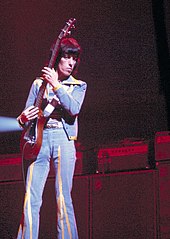Bass players by definition are solid and dependable, working on the ideal that less is more. The role of the bass was to hold the rhythm together and be a complementary element to the bass drum, space created in song was to be filled by the more melodic flavour of a guitar or keyboard. That idea was turned on it's head post World War II the genesis may have actually been slightly before with the work of jazz bassist Jimmy Blanton who was the first bass player to expand the role of the bass within a song. The idea that the bass had a more melodic and fluid role to play was expanded by the likes of Ray Brown, Charles Mingus and Paul Chambers in the 1950's. This ideal of exploration which was often at the heart of modern jazz development crossed over to rhythm and blues and rock and roll players who wanted to adapt that style to the more concise and restricted field of popular music.
The likes of James Jamerson and especially Tommy Cogbill at American Sound in Memphis were hugely influential on other musicians during the 1960's and into the decades after. As previously mentioned I've been reading the book The Memphis boys which focuses a lot on Tommy Cogbill and I'll be featuring some of the seminal 45's he played on in future blogs. Someone who doesn't elicit widespread praise for his playing is Bill Wyman and it's something that has always puzzled me. Perhaps part of it lies in the fact that he was surrounded by such dominant and outrageous personalities in the likes of Keith Richards and Mick Jagger, part of it may lie in the fact that his role was often downplayed and certainly in the studio his bass was not always prominent in the mix. He genuinely seemed content to play the old style role keeping the foundations intact but there a few stand out tunes that demonstrate what an inventive bass player he was. One song that illustrates this point is one that is a cornerstone of their recording legacy and a must in their live show and that is Satisfaction. As the song starts and Keith's fuzztone guitar takes hold underneath is the fluid runs provided by Bill that match perfectly with Richard's solo. During the versus Wyman locks into the groove but in the chorus makes these nice little runs that are often hard to hear but I remember listening to it on vinyl as a kid and being more impressed with the bass lines than I was with the guitar work.

No comments:
Post a Comment